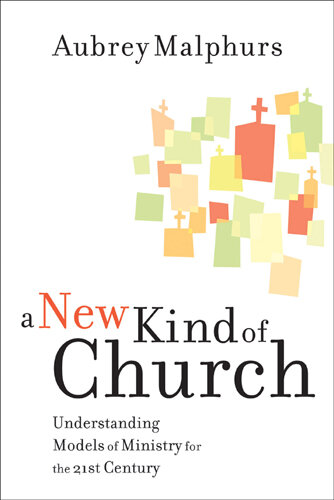Aubrey Malphurs, A New Kind of Church: Understanding Models of Ministry for the 21st Century. Baker, 2007.
Referenced in: Ecclesiologies
LifeandLeadership.com Summary
Theology of Mission and Ministry.
Summary: A New Kind of Church is an excellent example of contextualized ecclesiology, exploring God’s intent for the church into a specific cultural setting, in our case Western society generally and North America particularly. Aubrey Malphurs is a widely read author on church leadership among evangelicals. He writes out of practical experience as a church consultant and as an academic involved in training ministers. This gives him broad exposure to church trends. He brings that exposure to bear in this volume, which suggests criteria for evaluating newer church models that have arisen in the late-20th and early-21st centuries, and how churches arrive at the approach that is best for their context.
The book is divided into two parts. In Part 1, Malphurs chronicles the big picture of changes that are occurring in churches, the unchurched, and those in cults and religious groups. He then offers five reasons as to explain why churches are changing, and then presents an argument on why they should change.
Part 2 offers insight into how to be discerning about the new-paradigm churches. He offers biblical teaching on how congregations should do church and how they should approach change. He presents a theology of culture and a defense of church’s responding to cultural shifts. He proposes a definition of the local church as a basis for evaluating the legitimacy of church models. In a chapter on “The Serving Church,” he provides a reader with biblical teaching on the church’s need to serve and not be served. He responds to critics of new paradigm churches, and proposes criteria for developing good models.
From the Publisher
Aubrey Malphurs addresses these important questions and suggests that there is room for new ways of doing ministry while being true to Scripture. In the process, he offers a theological and interpretive framework for evaluating any church model, new or old. He also offers suggestions for implementing change in the local church.
There is no shortage of books these days on new ways of “doing church.” New church models have been both warmly embraced and roundly criticized. How should we do church in a changing world? There’s no question the world is changing. Many churches are changing with it, adopting new models for ministry: emergent, seeker, purpose-driven, multisite, and so on. These models have been greeted with enthusiasm, but also with controversy and criticism. What are church leaders and others concerned about the state of the church to make of all this? Does Scripture prescribe a standard model for doing church? Or is there freedom within certain guidelines?
In A New Kind of Church, respected church consultant Aubrey Malphurs addresses these important questions. The heart of the book outlines a means for evaluating any church model, including:
- A proper way of interpreting what Scripture says about the local church
- A theology of change
- A theology of culture and church
- A definition of the local church
This important book is for anyone concerned with the state of the church, but it is especially valuable for church leaders considering change in their own churches.
About the Author
Aubrey Malphurs (Ph.D., Dallas Theological Seminary) is professor of pastoral ministries at Dallas Theological Seminary and president of The Malphurs Group. He engages in church consulting and training and is the author of numerous books, including Developing a Vision of Ministry in the Twenty-first Century.
***For additional information on this resource, including reviews, click the bookstore links. Check the reference at page top or the links below for resource guides on related topics.***
Related Areas
See Other Resources on Theology of Mission and Ministry:
See Other Resources on Church Leadership and Renewal:
- Church Leadership and Renewal, Index
- Church Leadership, Theological Foundations, Ecclesiology
- Church Leadership, Philosophical Foundations – e.g. Church Growth, Missional, Emergent, and Other Missionally Responsive Trajectories
- Church Leadership, Practical Foundations – Church Dynamics and Research
- Church Leadership, Practical Foundations – Congregational Culture, Church Identity
- Church Leadership, Practical Foundations – Size Dynamics, Size Transitions
- Church Leadership, Practical Foundations – Research and Case Studies on Effective Churches
- Church Leadership, Special Situations – Small Church Development
- Church Leadership, Strategies for Renewal
See Resources on Over 100 Areas of Ministry Leadership:


